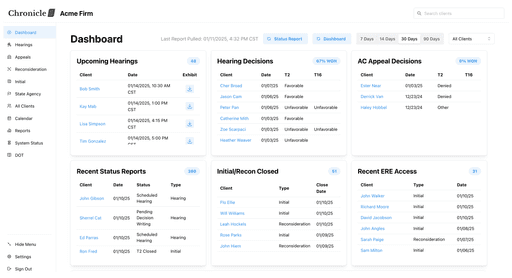13 March, 2024
by Nikhil Pai
In the fast-paced world of Social Security Disability (SSD) representation, managing caseloads efficiently is more than a necessity—it's an art. The key workflow challenge for SSD representatives lies in accessing Electronic Records Express (ERE) to retrieve documents and check the status of cases. Traditionally, this process has been cumbersome, time-consuming, and frankly, a bit of a headache. Representatives had to open each client's file individually, making it difficult to track new documents, especially when handling hundreds of cases. Thankfully, the digital age brings with it solutions designed to alleviate these pains: Atlasware by Assure, Chart Request, and Chronicle. Each offers unique features aimed at simplifying document management, notifications, team access, metrics analysis, client data and leveraging AI technologies. But which one stands out? Let's break it down.
Document Management and Exhibit Packet Generation
Atlasware by Assure shines in its document OCR (Optical Character Recognition) and merging capabilities, making it a go-to for firms in need of creating searchable and easily navigable exhibit packets for hearings. It's the standard bearer for many, having honed its craft over the years.
Chart Request, on the other hand, focuses on reliable ERE document retrieval and creates HIPAA-compliant audit trails. However, it delivers raw documents and leaves it up to the firm to OCR and merge.
Chronicle steps into the future with AI-enabled document handling, offering a sleek solution for those looking to integrate cutting-edge technology into their workflow. OCRs and merges documents just like Atlwasware, but takes it a step further, automatically transcribing hearing audio.
Notifications and Updates
Staying informed on case progress is crucial. Atlasware has built a reputation for generating excellent exhibit packets but has been criticized for glitchy notifications, with case activity updates coming at an additional cost. Chronicle takes the lead in this category with real-time notifications, ensuring that representatives are always in the loop.
Team Access and Workflow Integration
Collaboration within a firm can significantly enhance efficiency. Atlasware and Chronicle both offer team access, facilitating a collaborative environment. Chronicle goes a step further by integrating with Zapier, allowing for customized workflow automation, which is a boon for tech-savvy firms. Chart Request, being fully outsourced, might limit hands-on team collaboration due to its nature.
Metrics and Performance Analysis
Understanding your firm's performance through metrics can guide strategic decisions. Chronicle excels with dashboards showcasing firm metrics, such as win rates and wait times for hearing decisions, offering a comprehensive view of performance. Atlasware, while providing basic total number metrics, falls short in trend analysis, potentially leaving firms craving more in-depth insights.
AI and Efficiency
The role of AI in enhancing efficiency can't be overstated. Chronicle leads the pack with AI capabilities, promising a more efficient understanding of cases. This positions Chronicle as the forward-thinking choice for firms eager to leverage technology for analytical and efficiency gains. Unfortunately, Atlasware has yet to incorporate AI into its platform, which might put it at a disadvantage as the industry evolves.
Client Data
Chart Request and Chronicle distinguish themselves with robust data protection policies, operating independently from law firms or insurance brokers, thus avoiding conflicts of interest and ensuring client data is used strictly for case management. They do not engage in unsolicited client contact or data mining, in stark contrast to Atlasware, which, due to its affiliation with an SSD firm and partnership with Insurance Branch, requires clients to opt-out of data mining and solicitation. Some see this as a feature as it make Atlasware a one stop shop of services, however, many prefer to talk to their client first before selling additional services.
Pricing and Accessibility
Pricing often plays a significant role in decision-making. Atlasware offers its services at $5-9 per case, which can add up but is in line with its established value proposition. Chronicle proposes a competitive pricing model at $5 per client, coupled with advanced features, making it an attractive option. Chart Request remains a wildcard with undisclosed pricing, which could be a deciding factor for many firms.
Conclusion: Choosing the Right Tool for Your Firm
Deciding between Atlasware, Chart Request, and Chronicle boils down to what your firm values most: Is it the reliability and exhibit packet generation of Atlasware, the HIPAA compliance and document retrieval of Chart Request, or the AI capabilities and real-time updates of Chronicle? Each solution has its strengths and limitations, and the best choice will align with your firm's specific needs, workflow preferences, and long-term technological strategy.
As the SSD landscape continues to evolve, embracing technology that enhances efficiency, fosters collaboration, and provides actionable insights will be key to staying ahead. Whether it's the seasoned reliability of Atlasware, the outsourced convenience of Chart Request, or the innovative approach of Chronicle, the right tool can transform your workflow, empower your team, and ultimately, lead to more successful case outcomes.







